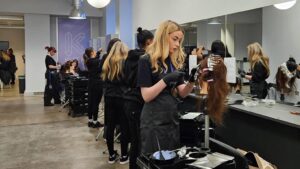
The Basement Gym + Studio opens in Camden Town
Camdenist readers get 50% off their first month’s membership, too

Rebecca Holbourn is a writer and director from London who studied playwriting at the National Theatre before co-creating Dramatic Chaos Productions.
They have had their writing performed at multiple theatres and online, and directed many short plays and films. Violated is Rebecca’s latest, most personal play and ongoing project, debuting this summer (4th-6th Aug) at Camden Fringe.
Violated is about broken consent and violation – something we’ve all experienced to different degrees. The memories that haunt us and play a part in who we are today can almost always be traced back to a lack of consent. In the play, the two characters ‘Woman’ (played by Tamsin Harding) and ‘Man’ (played by Arthur Perdreau) each have their own experiences and questions that they’re working through.
The majority of the play is two tightly intertwined monologues and it’s all based on real-life experiences, in large part by myself and part by anonymous contributors, which also could include members of the audience.
It’s my first play to be treading the boards at Camden Fringe and it felt apt (and terrifying) to make it something so powerful, that people are reluctant to discuss. To an extent, it was partly cathartic acceptance writing it. To then share it makes it real and acknowledged, which dampens the power some experiences still hold to this day.
The characters go on their own journeys of discovery (often exploring similar ideas at the same time) and bring the audience along as they challenge a variety of societal norms, shared-across-generations experiences and various true memories that can’t be shaken.
They reference their early memories, growing up with troubling games and rumours about teachers or bad men… But they also reference the bigger instances, how they didn’t feel like they could or should say no.
As the ‘Woman’ recalls her various encounters, the audience is asked to question, “How many of these experiences have I also been party to? How many have I vocalised to another soul? Why do we keep them secret?”.
The ‘Man’ attempts to vocalise his singular defining sexual assault and his place in the world after it, the audience is asked to query, “How much pressure are men under to always appear strong? Do the men in my life feel open to talk emotionally? Do I always feel like I can say “No”?”.
At the end of the play, anonymously submitted examples of broken consent or violation are read out at random and the audience is reminded about the power of the word “No”.
What’s wonderful is that the numbers have gone up at all. It’s horrific to see the increase, yes, but it means more people are starting to speak out. Change can only happen that way. Less than 2% of cases brought charges last year, which just proves how hard it is to make any convictions or slow down people from violating more.
Everyone still largely discusses that it’s on the women. That they should dress less revealing or not go out. It’s a tiny part of the picture. My favourite and utterly least favourite statistic comparison is that:
Last year the police recorded around 70,000 cases. That means that 350,000 cases were unrecorded. Just against women. It needs to change. The system needs to believe in the violated person more. It ruins lives. Waiting years for cases to go to court ruins lives. Rescheduling cases. Throwing cases out because of a lack of evidence. People need to be understood and believed. False accusations are very rare.
Everyone has been brought up in a patriarchal society, despite having had a Female on the throne. Everyone has been taught that the people with strength and success, “the people to aspire to be… are the men”. Successful women are treated as an exception and are still expected to act and dress like a man, but with curves and legs to be looked at. Fashion holds a strong grasp over women. Women are told to pay attention, to dress well, wear fitted clothes and yet, if you show any skin, then you’re a flirt who is trying to undermine the men in charge.
There are a lot of pre-conceptions which we carry with us, and have to acknowledge are there to move past them. Women are equals. Clothes are clothes. Bodies are bodies. It’s not all about sex. In fact, having a body and wearing clothes which you feel good in has zero to do with sex. So, brushing aside men leering and catcalling with “boys will be boys” or “they’re just thinking with their other head” diminishes the responsibility they need to take over themselves. Admire, but don’t invade.
Consent not being just about sex is one of the key messages of the play. The Man discusses how one of his earliest memories is when is Dad didn’t ask him if he could give away some old toys.
“I still remember how betrayed I felt when my Dad decided that I was too old for some of my toys and when I got home from school one day, they’d gone… My parents brushed off how upset I was but I still remember. Part of me, to this day, wants to go buy an Action Man or the Hungry Caterpillar… They were taken from me without my consent!”
We’ve had so many explorative conversations from various parts of the play. The toys always strikes a chord, because you remember that objects have very different meanings to other people. Kids cherish their toys, they belong to them, it’s what they love and own.
Adults have technology, glasses, drinks, houses and cars. The value of them is abstract to children. The value of comfort toys is long-forgotten to practically be abstract to adults. They’re all important. We’re all different. Relish individuality. Never assume.
The biggest thing we’re after is discussion. We want people to go away and talk with their loved ones. Consider that their past still travels with them. The good and the bad. Acknowledge the power in the word “No” and go forth to be Violated No More.
We plan to build up the discussion on our Youtube channel with a variety of people, topics and memories. This is more than a play. It’s a discussion and a movement.
We would absolutely love for people to submit their experiences in our anonymous survey. Reduce the power of those memories and share them. Perhaps you’ll even be read out on stage. We’re all in this together. Be the change you want to see. Power to the word “No”. We will be #ViolatedNoMore
The link to the survey, to buy tickets, our crowdfunder and to find us on social media is all here.
Camden Fringe 2023 // Violated is at Camden People’s Theatre 4th, 5th and 6th August. Tickets and info here.

Camdenist readers get 50% off their first month’s membership, too

A brand new hairdressing and barbering academy has landed in Camden Town and is now seeking style-conscious models and enthusiastic trainees

We speak to founder, Sol, about bringing the studio to Kentish Town

Explore the neighbourhood’s brand new neighbourhood